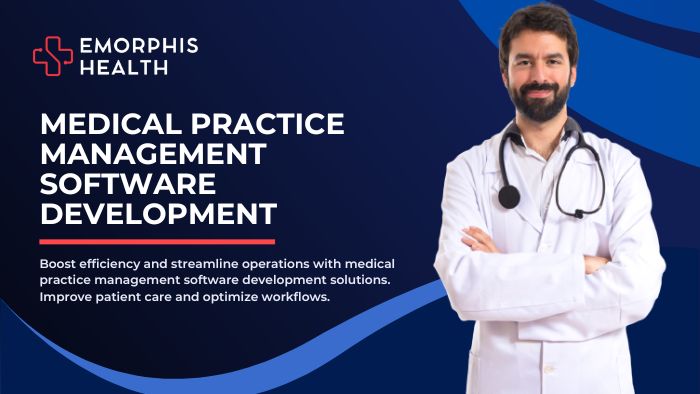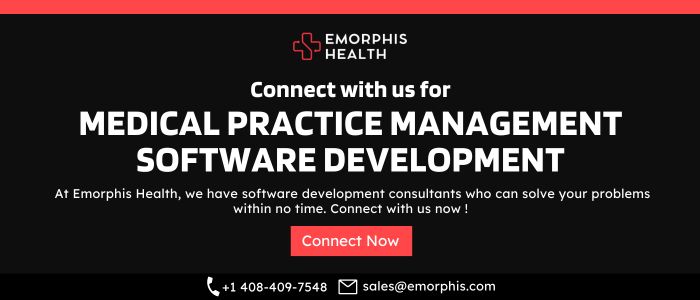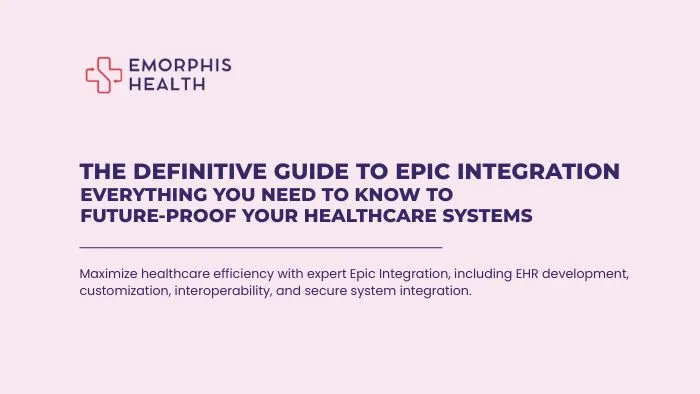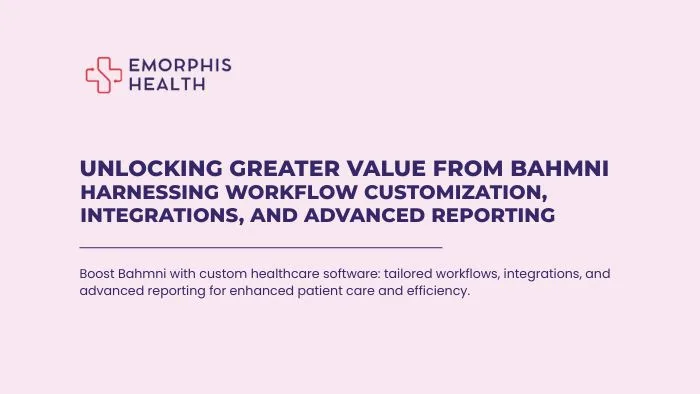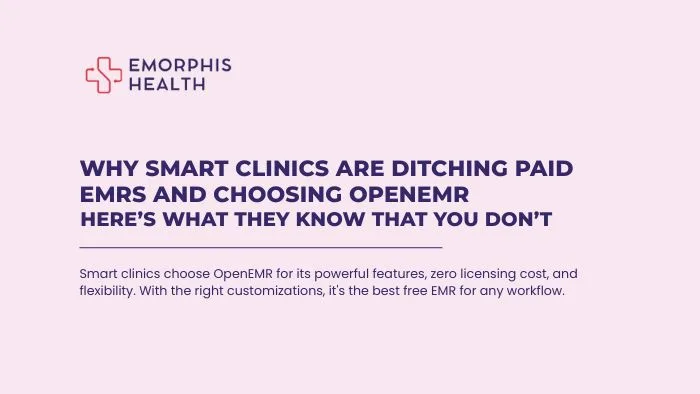Introduction
See Contents
- 1 Introduction
- 2 Why is Medical Practice Management Software development in trend?
- 3 Key Features and Functionalities of Medical Practice Management Software
- 4 What are the compliances that need to adhere to while medical practice management software development?
- 5 Benefits of Medical Practice Management Software
- 6 What is the importance of engaging a medical software development company or healthcare software developers for the development of medical practice management software?
- 7 The Development Process
- 8 Conclusion
In the fast-paced world of healthcare, efficient management of medical practices is crucial for providing quality patient care. With the advent of medical practice management software development solutions, healthcare professionals can now streamline their administrative tasks, enhance productivity, and improve patient outcomes. In fact, medical practice management software is an integrated solution designed to facilitate the day-to-day operations of healthcare facilities, including clinics, hospitals, and private practices. It combines various functionalities such as appointment scheduling, electronic health records (EHR) management, billing and claims processing, inventory management, reporting and analytics, and more. By automating administrative tasks and centralizing critical information, this software empowers healthcare providers to focus on delivering exceptional patient care.
According to a report by Verified Market Research, the Medical Practice Management Software Market had a valuation of USD 6.80 Billion in 2021 and is anticipated to reach USD 13 Billion by 2030, exhibiting a compound annual growth rate (CAGR) of 7.47% during the period from 2022 to 2030.
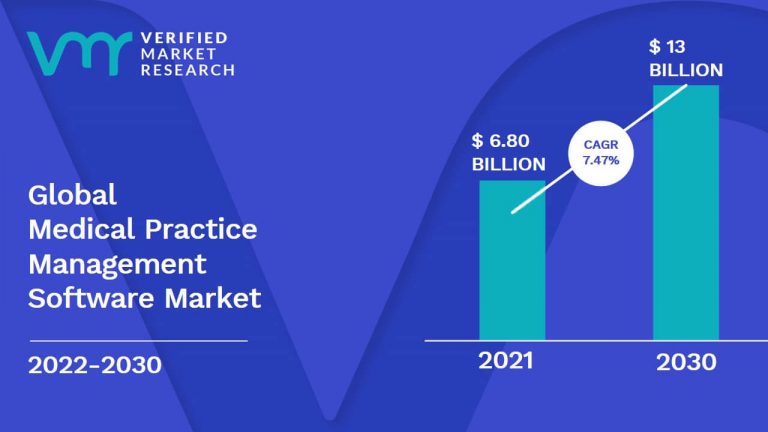
Why is Medical Practice Management Software development in trend?
The rising popularity of medical practice management software development can be attributed to various factors. Here are some key drivers behind its increasing trend:
A. Increased Efficiency
Medical practice management software automates and streamlines administrative tasks, reducing manual efforts and improving efficiency. In fact, it enables healthcare providers to manage appointments, patient records, billing, and other administrative functions more effectively. This efficiency translates into time savings, improved productivity, and also enhanced patient care.
B. Digital Transformation in Healthcare
The healthcare industry is undergoing a significant digital transformation. in fact, healthcare providers are recognizing the need to adopt technology solutions to stay competitive, provide better patient experiences, and optimize their operations. Medical practice management software plays a vital role in this transformation by digitizing and also automating key processes.
C. Improved Patient Experience
Patients expect convenience, easy access to information, and streamlined processes when it comes to healthcare services. Medical practice management software enables patients to schedule appointments online, receive automated reminders, access their medical records, and also communicate with their healthcare providers more effectively. This improves the overall patient experience and satisfaction.
D. Regulatory Compliance
Healthcare providers must adhere to various regulations and standards, such as HIPAA (Health Insurance Portability and Accountability Act). Medical practice management software offers features and functionalities specifically designed to ensure compliance with these regulations. It provides secure storage and access control for patient data, reduces the risk of breaches, and simplifies compliance processes.
E. Integration with Electronic Health Records (EHR)
Integration between medical practice management software and EHR systems is becoming increasingly important. The seamless exchange of data between these systems eliminates duplicate data entry, enhances data accuracy, and improves overall workflow efficiency. It enables healthcare providers to access patient information easily, make informed decisions, and also provide comprehensive care.
Click to read more details about EHR And EMR Integration For Your Healthcare Organization
F. Data Analytics and Reporting
Medical practice management software provides robust reporting and analytics capabilities. in fact, it allows healthcare providers to generate insightful reports, analyze key performance indicators, and make data-driven decisions. This analytics help identify operational bottlenecks, track financial performance, optimize resource allocation, and improve overall practice management.
G. Remote Access and Telehealth Capabilities
With the rise of telehealth and remote patient care, medical practice management software has evolved to support these models. In fact, it enables healthcare providers to offer virtual consultations, manage telehealth appointments, and seamlessly integrate telehealth data into patient records. This flexibility and remote access capabilities have become crucial, especially during the COVID-19 pandemic.
H. Cost Savings and Revenue Optimization
Medical practice management software helps optimize revenue cycles by streamlining billing processes, reducing claim denials, and also improving reimbursement efficiency. It also helps minimize operational costs by eliminating paper-based processes, reducing administrative overhead, and optimizing resource utilization.
Hence, medical practice management software development is in trend because it empowers healthcare providers to deliver efficient, patient-centric care while optimizing their operations. It addresses the challenges of manual processes, enhances productivity, improves patient experiences, and supports the ongoing digital transformation in the healthcare industry.
Key Features and Functionalities of Medical Practice Management Software
1. Appointment Scheduling
Medical practice management software enables healthcare providers to efficiently manage appointments by offering real-time booking, automated reminders, and calendar integration. This feature reduces no-shows, optimizes patient flow, and improves overall scheduling efficiency.
Use case: A patient can easily schedule an appointment online, receive automatic reminders via email or SMS, and have their appointment seamlessly added to the healthcare provider’s calendar.
2. Electronic Health Records (EHR) Management
The software provides a secure and centralized platform for managing electronic health records. It allows healthcare providers to create, update, and access patient records digitally, ensuring accurate documentation, easy information sharing, and also improved patient safety.
Use case: A doctor can quickly access a patient’s complete medical history, including past diagnoses, lab results, and treatment plans, in a user-friendly interface. They can update the records in real time and securely share relevant information with other healthcare professionals involved in the patient’s care.
3. Billing and Claims Processing
Medical practice management software simplifies the billing process by automating tasks such as generating invoices, verifying insurance eligibility, submitting claims electronically, and tracking payments. This feature minimizes errors, accelerates reimbursements, and improves revenue cycle management.
Use case: The software automatically generates accurate invoices based on the services provided, verifies insurance coverage, and submits electronic claims to insurance companies. It tracks the status of claims, identifies any denials or discrepancies, and assists in resolving billing issues efficiently.
4. Revenue and Financial Management
The software includes financial modules that facilitate financial analysis, revenue forecasting, and tracking of key performance indicators. It helps healthcare providers manage accounts receivable, generate financial reports, and ensure compliance with billing regulations.
Use case: Healthcare administrators can generate financial reports to analyze revenue trends, track expenses, and monitor financial performance. They can identify areas of improvement, forecast revenue, and make data-driven decisions to optimize practice finances.
5. Inventory Management
For healthcare facilities that require medical supplies and inventory management, the software offers features to track stock levels, automate reordering, and manage supplier information. This functionality ensures an adequate supply of necessary items, minimizes stockouts and prevents excessive inventory.
Use case: The software keeps track of medical supplies in real time, automatically notifies staff when stock levels are low, and generates purchase orders for replenishment. This ensures that healthcare providers have the necessary equipment and supplies to deliver quality patient care.
6. Reporting and Analytics
Advanced reporting tools in medical practice management software enable healthcare providers to extract meaningful insights from large volumes of data. They can monitor practice performance, identify trends, track patient outcomes, and make data-driven decisions for process improvement.
Use case: Administrators can generate comprehensive reports on patient demographics, appointment trends, revenue analysis, and other key metrics. This information helps in identifying operational bottlenecks, optimizing resource allocation, and improving overall practice management.
These key features and functionalities of medical practice management software enhance operational efficiency, improve patient experiences, optimize revenue cycles, and support data-driven decision-making in healthcare practices. The software provides a comprehensive solution for managing appointments, electronic health records, billing, financials, inventory, and analytics, empowering healthcare providers to deliver exceptional patient care while streamlining their operations.


What are the compliances that need to adhere to while medical practice management software development?
Developing medical practice management software requires adherence to various compliance standards to ensure the security, privacy, and integrity of patient data. Here are some key compliances that need to be considered:
a) HIPAA (Health Insurance Portability and Accountability Act)
HIPAA sets the standards for protecting sensitive patient health information (PHI). Compliance with HIPAA regulations is crucial for medical practice management software development. Some key requirements include implementing security safeguards, maintaining data privacy, conducting risk assessments, and providing secure data transmission and storage.
b) GDPR (General Data Protection Regulation)
If the software is intended for use in the European Union or handles data of EU citizens, compliance with GDPR is essential. GDPR focuses on the protection of personal data and provides guidelines for consent management, data minimization, data subject rights, and data breach notifications.
c) HITECH Act (Health Information Technology for Economic and Clinical Health Act)
The HITECH Act, a part of the American Recovery and Reinvestment Act, strengthens HIPAA regulations and promotes the adoption of electronic health records (EHR). Compliance involves ensuring the security and privacy of electronic health information and implementing safeguards to protect against data breaches.
d) ONC (Office of the National Coordinator for Health Information Technology) Certification
If the software is intended to be used for electronic health records (EHR) management, achieving ONC certification is important. This certification ensures that the software meets specific standards and functionalities set by the ONC, enabling interoperability and data exchange with other certified EHR systems.
e) PCI DSS (Payment Card Industry Data Security Standard)
If the software handles payment card information for billing and payment processing, compliance with PCI DSS is necessary. This standard ensures the secure handling of cardholder data, including encryption, access controls, and vulnerability management.
f) FDA Regulations
If the software includes medical devices or functionality related to medical devices, compliance with the regulations set by the U.S. Food and Drug Administration (FDA) is crucial. This includes following the FDA’s guidelines for software validation, quality systems, adverse event reporting, and post-market surveillance.
g) State and Local Regulations
Depending on the geographical location and the specific requirements of the healthcare provider, there may be additional state or local regulations to consider. These regulations may relate to data privacy, patient consent, or specific healthcare practices.
It is important to engage legal and compliance experts familiar with healthcare regulations to ensure proper adherence to these compliance standards throughout the development process. Regular audits, security assessments, and ongoing monitoring should be implemented to maintain compliance and protect patient data.
Explore the complex landscape of Healthcare Software Regulations And Compliances


Benefits of Medical Practice Management Software
Enhanced Efficiency
By automating repetitive tasks, reducing paperwork, and centralizing data, medical practice management software significantly improves operational efficiency. It saves time, minimizes errors, and allows healthcare providers to focus on patient care.
Improved Patient Experience
Streamlined appointment scheduling, faster check-ins, and better communication enable a more satisfying patient experience. Patients appreciate the convenience of self-scheduling appointments, receiving automated reminders, and accessing their health records online.
Cost Savings
Automation of administrative tasks, efficient billing processes, and optimized inventory management lead to cost savings for medical practices. It reduces manual labor, eliminates paper-based processes, and enhances revenue cycle management.
Enhanced Data Security and Compliance
Medical practice management software prioritizes data security and ensures compliance with privacy regulations like HIPAA. It provides role-based access controls, encryption, regular backups, and other security measures to protect sensitive patient information.
Seamless Integration and Interoperability
Many medical practice management software solutions offer interoperability with other systems, such as EHRs, laboratory systems, and billing platforms. This enables the exchange of data and seamless integration with existing healthcare infrastructure, reducing duplication and improving data accuracy.


What is the importance of engaging a medical software development company or healthcare software developers for the development of medical practice management software?
Engaging a medical software development company or healthcare software developers for medical practice management software development offers several advantages and ensures the successful implementation of your software solution. Here are some key reasons why you need their expertise:
1. Domain Knowledge
Medical practice management software development requires a deep understanding of the healthcare industry, its workflows, regulations, and specific challenges. Medical software development companies or healthcare software developers have the necessary domain knowledge and experience to develop software solutions tailored to the unique needs of healthcare providers.
2. Compliance Expertise
Developing software for the healthcare industry involves strict compliance requirements, such as HIPAA, GDPR, and FDA regulations. Medical software development companies have experience in navigating these compliance frameworks and can ensure that your software meets the necessary standards, protecting patient data and avoiding legal issues.
3. Customization and Scalability
Medical practice management software needs to be customizable to fit the unique requirements of different healthcare providers. Medical software developers have the expertise to understand specific needs, workflows, and integration requirements of medical practices. They can develop scalable software solutions that can adapt to future growth and evolving industry demands.
4. User-Centric Approach
Healthcare software developers understand the importance of user-centric design in the healthcare industry. They can create intuitive and user-friendly interfaces that enhance user experience and improve workflow efficiency. Their expertise in designing software with a focus on patient and provider needs ensures high adoption rates and user satisfaction.
5. Technical Expertise
Developing robust and secure medical practice management software requires technical expertise in software development, database management, integration with other systems, and data security. Medical software development companies have skilled developers, architects, and quality assurance engineers who can ensure the software’s reliability, security, and performance.
6. Ongoing Support and Maintenance
Medical practice management software requires continuous support and maintenance to address issues, incorporate updates, and adapt to changing needs. Medical software development companies provide ongoing support, including bug fixes, feature enhancements, and security updates, ensuring the software remains reliable and up to date.
7. Collaboration and Project Management
Developing medical practice management software is a complex process that requires effective collaboration between the development team and healthcare providers. Medical software development companies have project managers who can effectively communicate, gather requirements, and ensure the software is developed according to the client’s needs and timeline.
By engaging medical software developers or a healthcare software development company, you can leverage their expertise, domain knowledge, compliance understanding, technical skills, and ongoing support to develop a customized, secure, and efficient medical practice management software solution that meets the specific needs of your healthcare practice.
The Development Process
Developing medical practice management software requires a systematic approach. Here are the key steps involved
- Step 1- Requirement Gathering: Engage with healthcare providers and stakeholders to understand their specific needs, pain points, and desired features. Conduct thorough research to identify industry regulations and compliance requirements.
- Step 2 – System Design: Based on the gathered requirements, create a system architecture and design the software. Take into account elements like scalability, security, user interface, and integration capabilities when developing medical practice management software.
- Step 3 – Development: Implement the design by coding the software components. This involves front-end and back-end development, database design, and integration with third-party systems if necessary.
- Step 4 – Testing and Quality Assurance: Conduct rigorous testing to ensure the software functions as expected, is user-friendly, and meets all requirements. Perform unit testing, integration testing, performance testing, and security testing.
- Step 5 – Deployment and Training: Once the software passes all testing phases, deploy it to the production environment. Provide comprehensive training to healthcare providers and staff to ensure a smooth transition and adoption.
- Step 6 – Maintenance and Upgrades: Regularly monitor the software for issues and provide ongoing support. Incorporate user feedback, introduce updates, and add new features to keep the software up-to-date and aligned with evolving industry needs.
Conclusion
Medical practice management software has transformed the way healthcare providers manage their operations, improve patient care, and optimize revenue cycles. By automating administrative tasks, streamlining workflows, and enhancing data accessibility, these software solutions empower medical practices to deliver efficient, patient-centric services. As technology continues to advance, medical practice management software development will play a vital role in shaping the future of healthcare administration.

